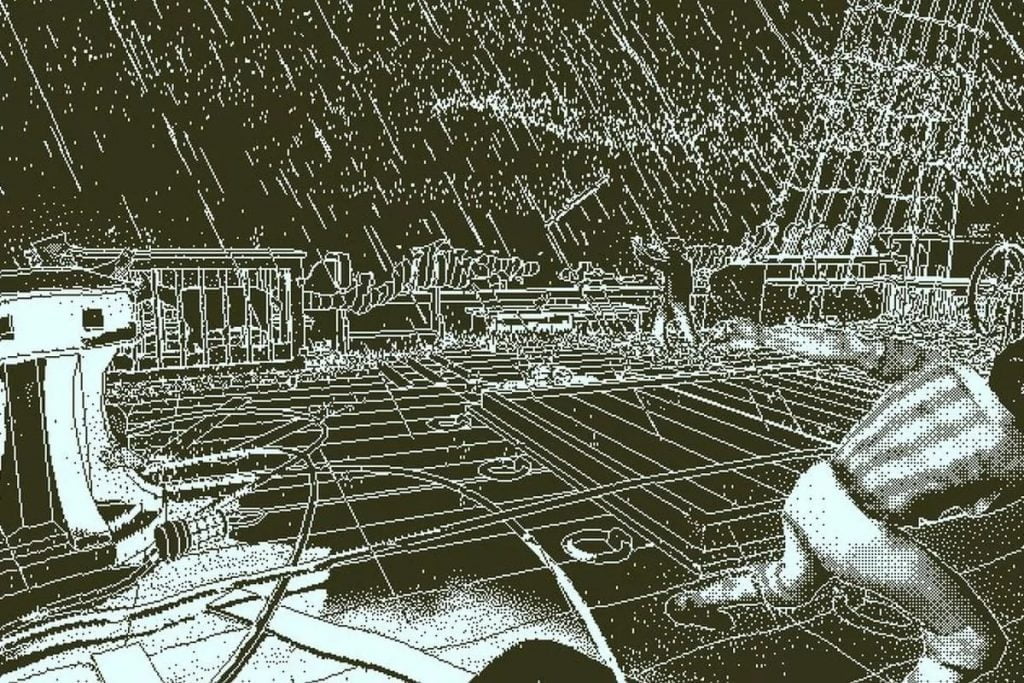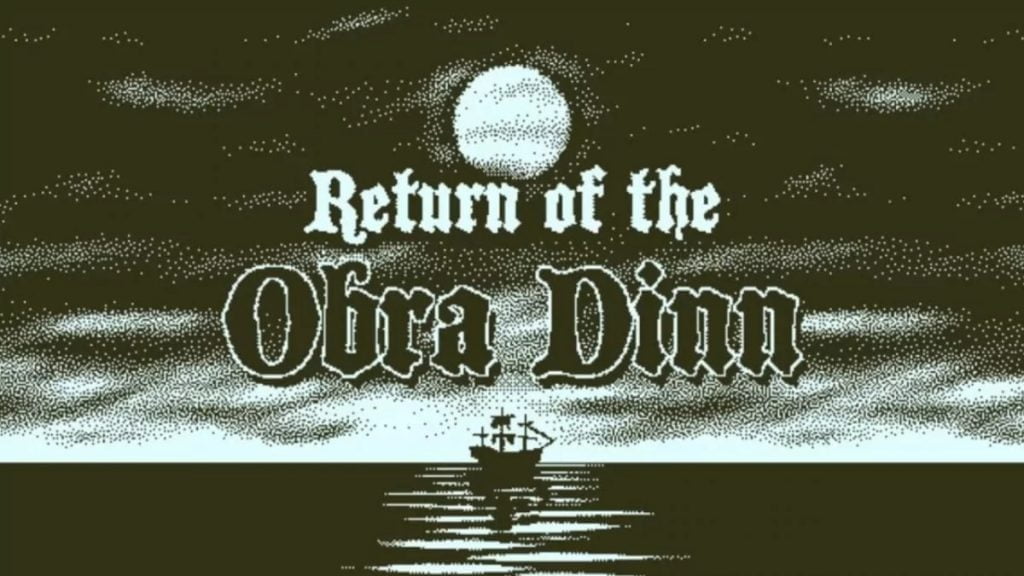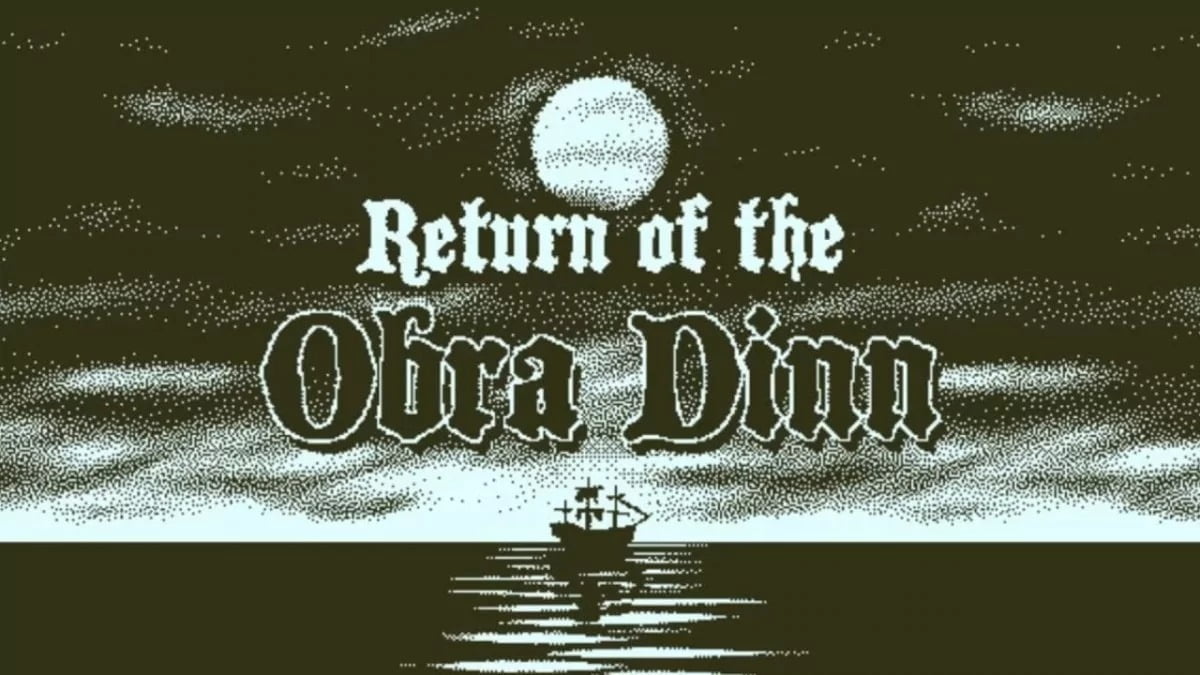The Return of Obra Dinn is an interesting game. The first thing that will strike you about it is the graphics. How it places you on a photo realistic classic merchant ship, but one rendered in a grainy monochrome palette reminiscent of a classic Macintosh computer. The second thing you notice is all the action has already happened. The ship is a crime scene and you’re not there as a swashbuckling pirate or a steely naval officer on a dangerous mission, you’re there to sort out what happened on behalf of the East India London Office as an insurance investigator.
It’s very… different.
The Obra Dinn was lost at sea five years before you step foot on its deck. There are no living witnesses to question and no survivors to interview. Instead, you are reliant on observation, deduction, and a mystical pocket watch that allows you to glimpse the exact moment of death for any corpse found on the ship. These ghost-like hallucinations catch just a few seconds of sound or dialogue right before a person dies, and it’s these meager clues that are key to solving the fate of each of the ship’s 60 crew members and passengers.
While you’re dependent on the mystical watch to view the individual moments of death that struck the crew, the tool you’ll rely on the most is your notebook. The notebook contains several hundred blank pages for you to fill as you connect the dots and solve the mystery of what happened to the Obra Dinn.

Getting started, you have only scant information to go by. A crew manifest (that may or may not be entirely accurate), a few sketches drawn during the Obra Dinn’s launch (which you’ll hopefully use to put faces to the various names of the crew), and the schematics of the ship itself. You take these small bits of information and what you can glimpse during the memento mortis vignettes to slowly piece together what fate befell which sailor and create a historical record of the voyage.
What makes this interesting to those of us in the business is that while the game hinges on a fantasy plot device and features some other worldly events, the actual premise is based on a real job!
Marine insurance stretches back to the times of ancient Greece and Rome, but the merchant era is when it really developed as its own unique and fully fleshed out field. As more and more vessels began to sail to increasingly distant and dangerous ports to trade, merchants and owners who depended on the safe return of these vessels looked for ways to minimize their risk of a loss (not altogether uncommon when sailing thousands of miles under wind power). Insurance markets began to pop up to meet this demand.
In 1686, Edward Lloyd (yes, the Lloyd from which Lloyd’s of London got its name) opened a coffee house on Tower street in London. For reasons not entirely clear, the establishment soon became a popular meeting place for sailors, merchants and shipowners where they would trade news and gossip related to their field. While the café did indeed serve coffee, it quickly became apparent that the clientele was thirsty for another type of service – insurance. Lloyd’s began an underwriting service that soon eclipsed the original purpose of the café.
As the business developed, Lloyd quickly devised more and more sophisticated methods of determining the value of a ship and its cargo. The types of policies afforded to those at sea (starting with just the vessel itself but eventually extending to the lives and livelihoods of crewmen). As well as different methods to settle claims. And that’s where investigators came in.
It didn’t take long for unscrupulous shipowners and traders to realize the potential value in falsely claiming a loss. “Oh, my ship sank off the coast of the Canary Islands…” “much of our cargo had to be tossed overboard to survive a storm” and so on. What was to stop a crew from leaving one port and pulling into another under a different name and claiming the original ship lost? How could anyone rightfully say whether a cargo was lost or if it were even recorded accurately to begin with? These were serious considerations, ones that necessitated a new type of investigator with the skills and savvy to fully explore each claim and verify its veracity.
Investigators would be dispatched from Britain to all corners of the globe, tracking down leads and following up on whispers. Log books would be scrutinized, witnesses questioned, informants consulted. The work was quite involved with some investigations taking years to complete.
If this sounds like a lot of work, you must remember that the value of a fully loaded merchant ship could be astronomical. The vessels themselves were nearly priceless, each requiring years of construction to become seaworthy. The cargo holds were specifically designed to store tons upon tons of valuable goods to be traded in ports far and wide. All of this is not to mention the crew, which could be anywhere from a dozen hands to nearly 100 experienced sailors depending on the size of the ship and purpose of its voyage. Blindly honouring each and every claim would have bankrupted even the most successful of insurance businesses. Hence the investigators, keeping shipowners honest and the entire business sustainable.

The Return of the Obra Dinn takes many liberties in the interest of presenting a fun and satisfying mystery to unravel, but there is a truth at its core. The slow methodical work of putting together the history of a tragedy, comparing notes and reviewing previously collected disparate documents to piece together a larger picture of what happened was exactly the work of an 1800s insurance investigator. What sounds like perhaps the most unusual premise for a video game ever reveals itself to be a satisfying and even thrilling experience.





0 Comments